- Home
- Farley Mowat
Bay of Spirits: A Love Story Page 2
Bay of Spirits: A Love Story Read online
Page 2
Our next port of call was Ramea, a cluster of small islands some fifteen miles offshore and outside the barricade of fog that sealed off the mainland coast. Ramea gave me my first real look at an outport–thirty or forty wooden houses clinging to treeless lumps of water-rounded rock. The houses were a sight to behold, painted in patterns and colours more spectacular than any rainbow. Purple, yellow, magenta, orange, and scarlet seemed to be the favourite hues, but some were like layer cakes, horizontally banded by two or three blazing colours. Riggs explained: “Afore we joined up to Canada no person spent money on paint for houses. Boats, certainly, but houses would be a waste. Then come the Canadian family allowances, pension and welfare cheques flying around like snow. And a crowd of paint salesmen from up-along who turned that money into paint. That’s why, Little Man, the outports looks like bowls of jelly beans.”
The fog closed in around us as we approached an unseen granite wall a few miles farther down the coast. The chart showed it to be not quite an impervious obstacle. Somewhere ahead was a narrow slit, behind which was said to lie the settlement of Grey River. There was no foghorn or anything else to guide us to it, but we had Skipper Riggs.
Baccalieu went charging in, horn bellowing every few seconds. Neither Riggs nor the lookout could have seen a thing except swirling fog. The murk became even darker.
“Got to be right here,” Riggs remarked conversationally. “You, Little Man, step out on the wing of the bridge. Stretch your hand out with a match into it. If it strikes and lights, let me know right quick.”
I was not amused. In truth, I was seriously apprehensive.
“Port a leetle,” said Riggs almost dreamily.
“Port it is, sorr,” repeated the helmsman.
“Steady as she goes.”
“Steady, sorr.”
With never a glimpse of the land, and running close to full speed in order to counter the outgoing tidal current, Baccalieu went through the unseen eye of the needle, a cleft in the face of the mountain not much wider than she was long.
Then Riggs turned to me with a slow smile.
“I believes we’s made it.”
Squeezed into a narrow crotch between barren, rocky hills, Grey River was tiny. Its two or three dozen houses and a small church with a tarpaper roof clinging to the slopes seemed very brave in their multicoloured paint.
The current was too strong to allow Riggs to take us alongside the tiny wharf so we offloaded two passengers and twenty or so packages into an open boat. Then the skipper rang for full ahead and soon we were back in the void of fog.
Unloading freight at Grey River.
At supper that evening I sat beside the chief engineer, a sour sort of fellow–or so I thought until I voiced a minor complaint about the captain’s perverse sense of humour, and the chief told me a little story.
Some years earlier the Baccalieu had been threading her way through a notorious maze of sunkers, reefs, and half-awash rocks on the Labrador coast when a woman passenger “from away” nervously asked Riggs if he knew where all the hidden dangers lay. The answer was pure Riggs.
“No, ma’am. I’m afeared as I don’t.” Long pause. Then, “But I hopes I knows where they ain’t.”
With night upon us I thought the skipper might take it easy. Not he. Moodily remarking that we were behind schedule (the steamers were always behind schedule) and ignoring the stygian darkness and dripping fog that enveloped us, he ran Baccalieu along the coast at full revolutions before hauling her into a little hole-in-the-wall called Cape la Hune.
The engine stopped and we drifted in an invisible world, our whistle blaring throatily like a matronly monster calling her brood. Three dories emerged out of the murk and came alongside. Freight was unloaded and a few passengers exchanged. Then everything vanished again and Baccalieu felt her way back out to sea.
I was sorry not to have seen La Hune. One of our stewards, who came from there, told me it consisted of ten houses clinging to a rocky spur jutting into the sea from the foot of towering cliffs. He said soil was so scarce that, in order to bury the dead, it had to be brought in by the dory-load and even that was sometimes washed away again by the next sou’west gale.
Baccalieu drove on through the night to another slit in the cliffs. This one was called Francois on the chart but known to everyone on the coast as Fransway. A small lighthouse clung to the rocks above the narrow entrance. Fortunately it had a diaphone–a foghorn–for we never saw the light at all. Riggs steered straight for the sound of the horn, then, at the last possible moment, told the helmsman to haul to starboard, and we slithered through a twisty gut of a channel into a rock-girt basin a quarter mile across that closely resembled the crater of an extinct volcano. The fog was thinner here, and the shape of the basin was eerily defined by the dim, yellow glow of oil lamps in the windows of a semicircle of unseen houses.
“I don’t suppose,” Riggs said gloomily, “we can lay alongside the fucking little wharf,” and then proceeded to do so, with a flourish.
The wharf, which was hardly longer than a good-sized dory, was jam-packed with people and black dogs, all of them evidently glad to see us. People swarmed aboard for a gam while the dogs headed for the galley looking for bones. The wharfinger (the man in charge of the wharf) told me that, four days earlier, the downbound steamer had gone past Fransway without coming in.
“That hang-ashore she got for a skipper be afraid to stick his nose in here for fear he’d bust it on the rocks. But Skipper Riggs now, that man’d sail the Baccalieu where Jonah went.”
The first mate assured me we would remain at the wharf for the rest of the night so I went gratefully to bed. He must have forgotten to tell Riggs, who at midnight ordered Baccalieu to sea again.
The next port should have been Rencontre West, a notoriously difficult place to enter even in daylight and clear weather. We were spared the attempt. Somewhere off a massive and unseen headland known as Iron Skull, our lookout spotted a spark of light in the murk ahead. This proved to be a gasoline lantern lashed to the mast of a dory. Baccalieu slowed and stopped. The dory came alongside, and we were hailed by someone wanting to know if Mrs. Fudge and her baby were aboard. They were. Would they get off? They would.
The companionway was lowered, and as Baccalieu rolled ponderously in the swell, the intrepid Mrs. Fudge and her baby were transferred into the dory.
This was a hairy business. The steward literally tossed the baby to a doryman, who caught it on the fly. The woman had to jump for it as Baccalieu rose and fell, a dark abyss gaping between ship and dory. The dory cast off, and as it vanished our propeller began to turn and we pulled away from this unmarked bus station in the sea.
Richards Harbour was another “rats’ burrow in the rocks,” as our first mate called it. We came to it at dawn, and the fog lifted as we entered a small and almost perfectly round harbour encompassed by low hills glowing red in the early light. Two schooners and a flock of dories and trap boats swung at moorings. The harbour was ringed with spidery constructs made of spruce poles, called “stages”–small wharves with little sheds on their seaward ends where fish were cut and gutted and fishing gear stored and repaired.
The houses clustered close to the landwash and to one another on steeply sloping ground, looking as if they had dug in their heels to prevent themselves from slipping into the harbour.
Back at sea, we welcomed a brisk westerly breeze that finally chased away the fog. I spent most of that day running from one wing of the bridge to the other, or climbing up to “monkey island” on top of the wheelhouse in order to miss nothing of the passing show. Newfoundland’s great inland plateau remained partially veiled in cloud, but the coast was revealed in all its brutal majesty–a colossal palisade of silvery-grey rock reared against the never-ending assaults of the western ocean.
That evening, at the invitation of the dour and diminutive chief engineer, I went below to admire the great reciprocating steam engine. Built to a design that had not changed significantly in a hundred
years, it was a symphony of polished brass and gleaming iron whose many shafts, cams, and arms ran slickly and almost soundlessly in a faint haze of steam. Here was none of the stupefying din produced by the giant diesels that drive more modern vessels. This was the dancing place of shadowy metal djinns performing to the soft fluting of escaping steam, the point and counterpoint of muted brasses, the occasional clash of cymbals, the pulsing rhythm of the mighty shaft revolving in its well-oiled bearings, and the clarion ring of telegraphed orders from the bridge.
The following night Baccalieu steamed through the labyrinthine passages of a great fiord that was virtually an inland sea. Called Bay d’Espoir on the charts, but known as Bay Despair, it thrust thirty miles inland and harboured half a dozen little settlements. I saw little of them. Exhausted by sightseeing, I slept my way around Bay Despair and was bitterly regretful when I woke next morning, for I had no way of knowing that I would return to spend some of the happiest times of my life in its web of mystery.
I rolled out of my bunk just as we were emerging from the bay, in time to watch Riggs do his stuff at Gaultois. In order to enter this busy little port, the site of a fish-filleting and-freezing plant, Baccalieu had to squeeze through an opening between a mid-channel rock and the mainland cliff with about twenty feet to spare on either side. She then had to turn completely around in her own length and ease into the wharf. Obviously it couldn’t be done. But Riggs paced up and down his bridge, muttering about “she-cunts,” and did the impossible, tucking the ship into place like a baby into a buggy.
That day we did the rounds of Hermitage Bay (Gaultois, Pink Bottom, Hermitage Cove, Grole) accompanied by a rising nor’easter to make things lively. By the time we reached Pass Island at the mouth of the bay an hour after sunset, the nor’easter had become a gale and there could be no thought–even by Ernie Riggs–of trying to moor to the small and exposed wharf of the small settlement on this pitch-black night filled with sound and fury.
There followed a most harrowing manoeuvre during which Riggs anchored Baccalieu as close to shore as he dared, with her bows to the storm and the breakers roaring close under her stern. Wind and tide acting together began to make her drag her anchor, but Riggs held her off the rocks by running the engine half ahead. We were not more than the ship’s own length from the breakers.
Meanwhile our little motorboat had been swung out and launched. It immediately developed engine trouble and with great difficulty was rowed back to the ship. Then the Pass Islanders tried to come out to us in two dories. Only one was able to make it. There was no possibility of putting any freight aboard it, but we had three women with two small children to go ashore. As they clung to the companion ladder and to three stewards, waiting to jump and scramble into the wildly pitching dory, Riggs paced the bridge, his gaze fixed on the rocks astern. The moment the dory left our side he gave Baccalieu full power. The anchor was brought home and we ran for the shelter of Jerseyman Harbour.
Here we found the middle portion of the wharf occupied by a big Royal Canadian Mounted Police patrol vessel. There was so little space remaining that, on his first attempt to dock, Riggs put Baccalieu’s bow aground. It was a soft touch, however, and she took no damage. He wiggled her off and tried another shot, laying his ship so close to the police vessel that a colossal crunch seemed certain.
The captain of the patrol boat was on his own bridge and we could see him clenching and unclenching his hands, but he said not a word. Perhaps he did not dare, for it was well known that Skipper Riggs despised the police for their interference with the local “import” trade in rum from the off-lying French islands of St. Pierre and Miquelon. In the event, the two vessels barely touched. The police skipper went silently and, I imagine, thankfully below. Riggs went growling to his cabin for an hour’s rest.
He reappeared when we reached Coombs Cove–an exposed little place without a wharf. It was still blowing half a gale and the seas were fierce as we anchored off. Three dories fought their way out to us, and into them we dropped the mail, twenty cases of beer, twenty more of pop, a hot-water boiler, a bed spring, four passengers, and numerous miscellaneous packages. Although practically awash under their loads, the little boats headed resolutely back toward their harbour.
“Takes some awful chances, they fellows,” was Riggs’s comment as he watched them go. I looked at him long and hard, but said not a word.
Next day found us entering the great bight called Fortune Bay–a world of its own with twenty outports strung along its ragged coast. It brought good fortune to us, for the sky cleared and the wind dropped out.
Instead of slowing down as we approached what Riggs referred to as a “one-dory hole” (it actually boasted a dozen or more), he rang the telegraph for full speed and Baccalieu came dashing into Saint-Jacques with a bone in her teeth. In a moment I saw why. There was room for only one vessel of her size at the wharf, and we had arrived just in time to edge out her sister ship Bar Haven, bound up the coast.
“I knowed Skipper Ro Penney were making a run for it,” our skipper said with a grin. “He left his radio turned on and I could hear him panting, he was that anxious to beat us to the wharf.”
A discomfited Bar Haven had to stand off and wait for two hours while we unloaded our cargo.
By the following noon we were as far along as Bay L’Argent. While the mate directed the offloading, Skipper Riggs told me the story of how Bar Haven had driven ashore here the previous autumn.
“A dirty black night in November, it was. Skipper Ro was inbound for Argentia when there come on a god-almighty westerly gale. We was moored snug in Hermitage Cove to ride it out, but Skipper Ro was caught all-standing. He tried to claw into Bay L’Argent but his radar give out and before he knowed it she run hard onto the Ragged Rocks at the mouth of the harbour.
“About two in the morning the mate wakes me. ‘Call from Captain Penney,’ he says. So I got on the radio.
“‘Come on down here, skipper,’ Ro says. ‘’Cause I’m aground.’
“‘Nah, bye, can’t be!’
“‘Yiss, old son, I is, and good and proper. Come right down here.’
“We let go the lines and put out into a howling starm. We give her everything she had. The chief tied down the safety valves and Baccalieu come out around Pass Island at fourteen and a half knots. With the gale behind us, we come near to flying across Fortune Bay. I don’t say the old girl ever went that fast afore or ever will again. When she lifted on the big fellows coming up astern, the screw come right out of water and she shook so bad she like to fall apart.
“We was off Bay L’Argent just at dawn, and there was the Bar Haven pounding on the rocks. Her bows was badly holed and she was flooded forward almost to her main deck. Didn’t look like she could last much longer. A great big sea was breaking over her stern and high along the cliff to looward of her. No chance to get a boat off of her, or a line ashore, and the wind and sea was shifting northerly lookin’ to roll her down.
“Well, there was twenty-five passengers aboard of her, a lot of them women and children. We had to do something….
“I turned Baccalieu around, heading into the storm. Dropped my bower anchor, let seven shackles of chain pay out, then brought her up and held her stern-to, as close as ever I dared to the Ragged Rocks.
“She was pitching and rolling something awful, but the mate got on our afterdeck and shot a rocket line onto Bar Haven’s afterdeck. Her people hauled over a heavy mooring line. Then we launched our lifeboat, shackled it to the line, and hauled it back and forth between the two vessels, bringing Bar Haven’s passengers and the most of her crew aboard of us. Took seven trips, and they were some lively rides! The women was pretty leery about getting into that little boat at all, and just as leery when it come time to scramble up Baccalieu’s side.
“The boat brought off one lady in her seventies clinging to the gunwales with my second mate behind her, holding her steady. Afraid he was squeezing her too hard, he eased off–and she went overboard.
/> “They fished her out pretty quick, and when we hoisted her aboard I poured her a big tumbler of rum. ‘Sink it down, my dear,’ I tells her.
“‘I would, could I hold onto the glass,’ says she.
“So I holds it for her and she sinks it down and asks could she have another. We put her to bed then, and she slept for twenty hours.
“What about Bar Haven? Well, Little Man, Skipper Ro and his engineer and a couple of others stayed aboard. When the storm died out, the salvage tugs come and hauled her off and patched her up and towed her into St. John’s, where she was repaired pretty good. Poor old thing.”
Some years later, when he had come to know me well enough, Skipper Riggs added a postscript to this story.
It had to do with an old Mi’kmaq woman from Eskasoni in Cape Breton. Every year for half a century this woman, who seems to have been known to whites only by her first name, Lizbet, made two journeys by steamer along the south coast of Newfoundland, selling handmade wicker baskets in the outports, where they were purchased not because they were needed but because it was believed they brought good luck. And that failure to buy one would bring bad luck.
In 1956 Lizbet had stored half of her supply of baskets in Canadian National’s freight shed at Port aux Basques, where they were trampled and largely destroyed by a bull that broke out of its shipping pen.
When the CN agent refused to pay damages, Lizbet said to him, “All right. That’s all right. You’ll pay later.” With which she put a curse on the CN coastal boats.

 Owls in the Family
Owls in the Family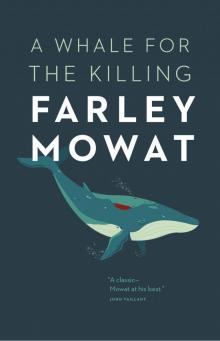 A Whale for the Killing
A Whale for the Killing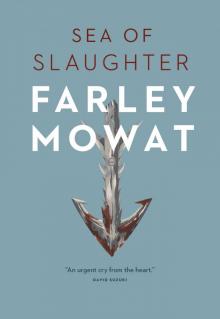 Sea of Slaughter
Sea of Slaughter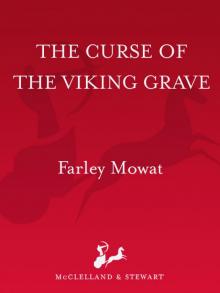 The Curse of the Viking Grave
The Curse of the Viking Grave The Boat Who Wouldn't Float
The Boat Who Wouldn't Float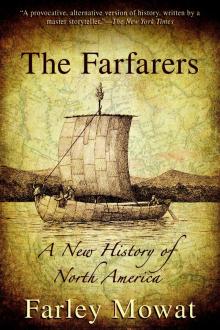 The Farfarers: Before the Norse
The Farfarers: Before the Norse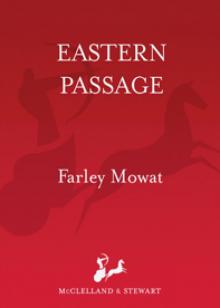 Memoir
Memoir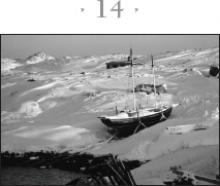 Bay of Spirits: A Love Story
Bay of Spirits: A Love Story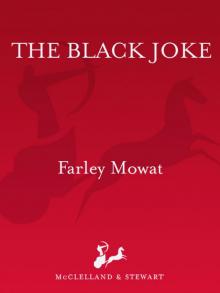 The Black Joke
The Black Joke Sibir: My Discovery of Siberia
Sibir: My Discovery of Siberia The Dog Who Wouldn't Be
The Dog Who Wouldn't Be Never Cry Wolf
Never Cry Wolf And No Birds Sang
And No Birds Sang The Snow Walker
The Snow Walker Born Naked: The Early Adventures of the Author of Never Cry Wolf
Born Naked: The Early Adventures of the Author of Never Cry Wolf Otherwise
Otherwise Lost in the Barrens
Lost in the Barrens Gorillas in the Mist
Gorillas in the Mist People of the Deer
People of the Deer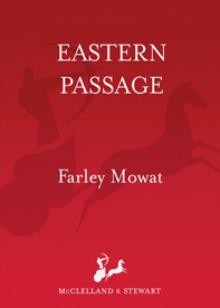 Eastern Passage
Eastern Passage Sibir
Sibir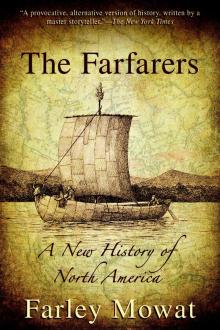 The Farfarers
The Farfarers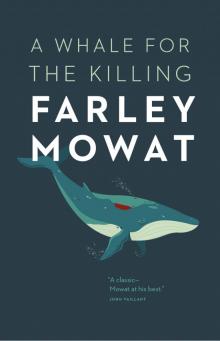 A Whale For The Killing (v5.0)
A Whale For The Killing (v5.0)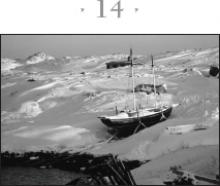 Bay of Spirits
Bay of Spirits And No Birds Sang (v5.0)
And No Birds Sang (v5.0) Born Naked
Born Naked